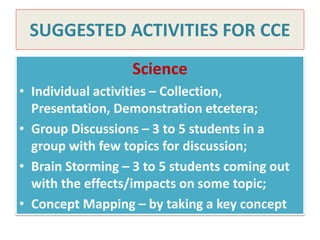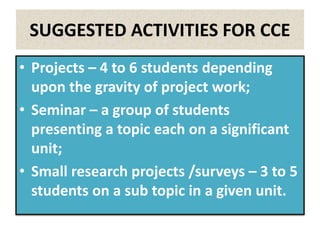Cce workshop on science
- 1. CCE WORKSHOP ON SCIENCE WELCOME T K Raghavendra, Block Educational Officer, Srinivaspur.
- 2. SUGGESTED ACTIVITIES FOR CCE Science âĒ Individual activities â Collection, Presentation, Demonstration etcetera; âĒ Group Discussions â 3 to 5 students in a group with few topics for discussion; âĒ Brain Storming â 3 to 5 students coming out with the effects/impacts on some topic; âĒ Concept Mapping â by taking a key concept
- 3. SUGGESTED ACTIVITIES FOR CCE âĒ Projects â 4 to 6 students depending upon the gravity of project work; âĒ Seminar â a group of students presenting a topic each on a significant unit; âĒ Small research projects /surveys â 3 to 5 students on a sub topic in a given unit.
- 4. GROUP DISCUSSION AN ILLUSTRATION ALTERNATIVE SOURCES OF ENERGY Topics for discussion ï need to look into alternative sources of energy; ï Impact of depleting sources of energy; ïAdvantages and disadvantages of a) conventional/non-renewable sources of energy b) non-conventional/renewable sources of energy
- 5. GROUP DISCUSSION ï Utility of renewable sources of energy; ï Judicial use of available sources of energy; ï Measures to reduce consumption of different sources of energy.
- 6. BRAIN STORMING Here a group of students discuss among themselves and come out with a final decision. An Illustration: Topic: ELECTRONICS âĒ Revolution in science and Electronic gadgets; âĒ Society and electronic gadgets.
- 7. CONCEPT MAPPING What is Concept Mapping? ïķ a method of representing the conceptual structure; ïķ concepts are isolated by circles and connected by lines with labels; ïķ concepts are arranged hierarchically â most general one at the top; ïķ effective for structure & process of knw process.
- 8. An Illustration for Concept Mapping Atomic Number Number of protons Electronic Configuration Valence Electrons Group and Period in the periodic table
- 9. Concept Mapping â an Illustration Molecules Motion Water heat Plants States Solids Liquids Gases Animals
- 10. RESEARCH PROJECTS/SURVEYS Here the students conduct small research projects/surveys on evidence from the field. Qualitative or quantitative depends on the nature of the topic and purpose. Needs to be done following certain specified stages.
- 11. STEPS IN RESEARCH PROJECTS/SURVERYS ï Identifying the area/topic of research; ï Identify the research question/problem; ï Selecting the sample; ï Collecting the data; ï Processing the data; ï Preparation and presentation of report.
- 12. CRITERION FOR ASSESSMENT General points to be considered: âĒ Objective of the activity; âĒ Participation of each student; âĒ Planning and Execution; âĒ Contribution from each member; âĒ Presentation of the activity; âĒ Outcome of the activity; âĒ Teachers overall observation.
- 13. CCE WORKSHOP ON SCIENCE THANK YOU ALL T. K. Raghavendra, BEO, Srinivaspur.












